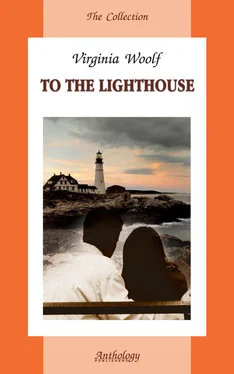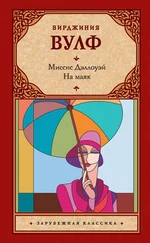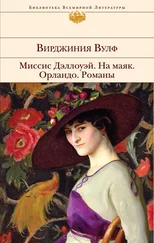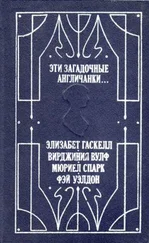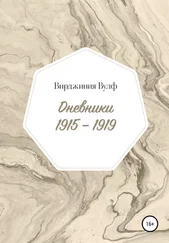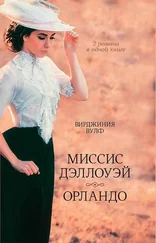Вирджиния Вулф - To the Lighthouse / На маяк
Здесь есть возможность читать онлайн «Вирджиния Вулф - To the Lighthouse / На маяк» — ознакомительный отрывок электронной книги совершенно бесплатно, а после прочтения отрывка купить полную версию. В некоторых случаях можно слушать аудио, скачать через торрент в формате fb2 и присутствует краткое содержание. Город: Санкт-Петербург, Год выпуска: 2005, ISBN: 2005, Жанр: foreign_prose, на английском языке. Описание произведения, (предисловие) а так же отзывы посетителей доступны на портале библиотеки ЛибКат.
- Название:To the Lighthouse / На маяк
- Автор:
- Жанр:
- Год:2005
- Город:Санкт-Петербург
- ISBN:5-94962-102-6
- Рейтинг книги:3 / 5. Голосов: 1
-
Избранное:Добавить в избранное
- Отзывы:
-
Ваша оценка:
- 60
- 1
- 2
- 3
- 4
- 5
To the Lighthouse / На маяк: краткое содержание, описание и аннотация
Предлагаем к чтению аннотацию, описание, краткое содержание или предисловие (зависит от того, что написал сам автор книги «To the Lighthouse / На маяк»). Если вы не нашли необходимую информацию о книге — напишите в комментариях, мы постараемся отыскать её.
To the Lighthouse / На маяк — читать онлайн ознакомительный отрывок
Ниже представлен текст книги, разбитый по страницам. Система сохранения места последней прочитанной страницы, позволяет с удобством читать онлайн бесплатно книгу «To the Lighthouse / На маяк», без необходимости каждый раз заново искать на чём Вы остановились. Поставьте закладку, и сможете в любой момент перейти на страницу, на которой закончили чтение.
Интервал:
Закладка:
That people should love like this, that Mr Bankes should feel this for Mrs Ramsey (she glanced at him musing) was helpful, was exalting. She wiped one brush after another upon a piece of old rag, menially, on purpose. She took shelter from the reverence which covered all women; she felt herself praised. Let him gaze; she would steal a look at her picture.
She could have wept. It was bad, it was bad, it was infinitely bad! She could have done it differently of course; the colour could have been thinned and faded; the shapes etherealised; that was how Paunceforte would have seen it. But then she did not see it like that. She saw the colour burning on a framework of steel; the light of a butterfly’s wing lying upon the arches of a cathedral. Of all that only a few random marks scrawled upon the canvas remained. And it would never be seen; never be hung even, and there was Mr Tansley whispering in her ear, “Women can’t paint, women can’t write…”
She now remembered what she had been going to say about Mrs Ramsay. She did not know how she would have put it; but it would have been something critical. She had been annoyed the other night by some highhandedness. Looking along the level of Mr Bankes’s glance at her, she thought that no woman could worship another woman in the way he worshipped; they could only seek shelter under the shade which Mr Bankes extended over them both. Looking along his beam she added to it her different ray, thinking that she was unquestionably the loveliest of people (bowed over her book); the best perhaps; but also, different too from the perfect shape which one saw there. But why different, and how different? she asked herself, scraping her palette of all those mounds of blue and green which seemed to her like clods with no life in them now, yet she vowed, she would inspire them, force them to move, flow, do her bidding tomorrow. How did she differ? What was the spirit in her, the essential thing, by which, had you found a crumpled glove in the corner of a sofa, you would have known it, from its twisted finger, hers indisputably? She was like a bird for speed, an arrow for directness. She was willful; she was commanding (of course, Lily reminded herself, I am thinking of her relations with women, and I am much younger, an insignificant person, living off the Brompton Road). She opened bedroom windows. She shut doors. (So she tried to start the tune of Mrs Ramsay in her head.) Arriving late at night, with a light tap on one’s bedroom door, wrapped in an old fur coat (for the setting of her beauty was always that – hasty, but apt), she would enact again whatever it might be – Charles Tansley losing his umbrella; Mr Carmichael snuffling and sniffing; Mr Bankes saying, “The vegetable salts are lost.” All this she would adroitly shape; even maliciously twist; and, moving over to the window, in pretence that she must go, – it was dawn, she could see the sun rising, – half turn back, more intimately, but still always laughing, insist that she must, Minta must, they all must marry, since in the whole world whatever laurels might be tossed to her (but Mrs Ramsay cared not a fig for her painting), or triumphs won by her (probably Mrs Ramsay had had her share of those), and here she saddened, darkened, and came back to her chair, there could be no disputing this: an unmarried woman (she lightly took her hand for a moment), an unmarried woman has missed the best of life. The house seemed full of children sleeping and Mrs Ramsay listening; shaded lights and regular breathing.
Oh, but, Lily would say, there was her father; her home; even, had she dared to say it, her painting. But all this seemed so little, so virginal, against the other. Yet, as the night wore on, and white lights parted the curtains, and even now and then some bird chirped in the garden, gathering a desperate courage she would urge her own exemption from the universal law; plead for it; she liked to be alone; she liked to be herself; she was not made for that; and so have to meet a serious stare from eyes of unparalleled depth, and confront Mrs Ramsay’s simple certainty (and she was childlike now) that her dear Lily, her little Brisk, was a fool. Then, she remembered, she had laid her head on Mrs Ramsay’s lap and laughed and laughed and laughed, laughed almost hysterically at the thought of Mrs Ramsay presiding with immutable calm over destinies which she completely failed to understand. There she sat, simple, serious. She had recovered her sense of her now – this was the glove’s twisted finger. But into what sanctuary had one penetrated? Lily Briscoe had looked up at last, and there was Mrs Ramsay, unwitting entirely what had caused her laughter, still presiding, but now with every trace of wilfulness abolished, and in its stead, something clear as the space which the clouds at last uncover – the little space of sky which sleeps beside the moon.
Was it wisdom? Was it knowledge? Was it, once more, the deceptiveness of beauty, so that all one’s perceptions, half way to truth, were tangled in a golden mesh? or did she lock up within her some secret which certainly Lily Briscoe believed people must have for the world to go on at all? Every one could not be as helter-skelter, [12] helter-skelter – (разг.) суматоха, беспорядок
hand to mouth as she was. But if they knew, could they tell one what they knew? Sitting on the floor with her arms round Mrs Ramsay’s knees, close as she could get, smiling to think that Mrs Ramsay would never know the reason of that pressure, she imagined how in the chambers of the mind and heart of the woman who was, physically, touching her, were stood, like the treasures in the tombs of kings, tablets bearing sacred inscriptions, which if one could spell them out, would teach one everything, but they would never be offered openly, never made public. What art was there, known to love or cunning, by which one pressed through into those secret chambers? What device for becoming, like waters poured into one jar, inextricably the same, one with the object one adored? Could the body achieve, or the mind, subtly mingling in the intricate passages of the brain? or the heart? Could loving, as people called it, make her and Mrs Ramsay one? for it was not knowledge but unity that she desired, not inscriptions on tablets, nothing that could be written in any language known to men, but intimacy itself, which is knowledge, she had thought, leaning her head on Mrs Ramsay’s knee.
Nothing happened. Nothing! Nothing! as she leant her head against Mrs Ramsay’s knee. And yet, she knew knowledge and wisdom were stored up in Mrs Ramsay’s heart. How, then, she had asked herself, did one know one thing or another thing about people, sealed as they were? Only like a bee, drawn by some sweetness or sharpness in the air intangible to touch or taste, one haunted the dome-shaped hive, ranged the wastes of the air over the countries of the world alone, and then haunted the hives with their murmurs and their stirrings; the hives, which were people. Mrs Ramsay rose. Lily rose. Mrs Ramsay went. For days there hung about her, as after a dream some subtle change is felt in the person one has dreamt of, more vividly than anything she said, the sound of murmuring and, as she sat in the wicker arm-chair in the drawing-room window she wore, to Lily’s eyes, an august shape; the shape of a dome.
Конец ознакомительного фрагмента.
Текст предоставлен ООО «ЛитРес».
Прочитайте эту книгу целиком, купив полную легальную версию на ЛитРес.
Безопасно оплатить книгу можно банковской картой Visa, MasterCard, Maestro, со счета мобильного телефона, с платежного терминала, в салоне МТС или Связной, через PayPal, WebMoney, Яндекс.Деньги, QIWI Кошелек, бонусными картами или другим удобным Вам способом.
Читать дальшеИнтервал:
Закладка:
Похожие книги на «To the Lighthouse / На маяк»
Представляем Вашему вниманию похожие книги на «To the Lighthouse / На маяк» списком для выбора. Мы отобрали схожую по названию и смыслу литературу в надежде предоставить читателям больше вариантов отыскать новые, интересные, ещё непрочитанные произведения.
Обсуждение, отзывы о книге «To the Lighthouse / На маяк» и просто собственные мнения читателей. Оставьте ваши комментарии, напишите, что Вы думаете о произведении, его смысле или главных героях. Укажите что конкретно понравилось, а что нет, и почему Вы так считаете.
